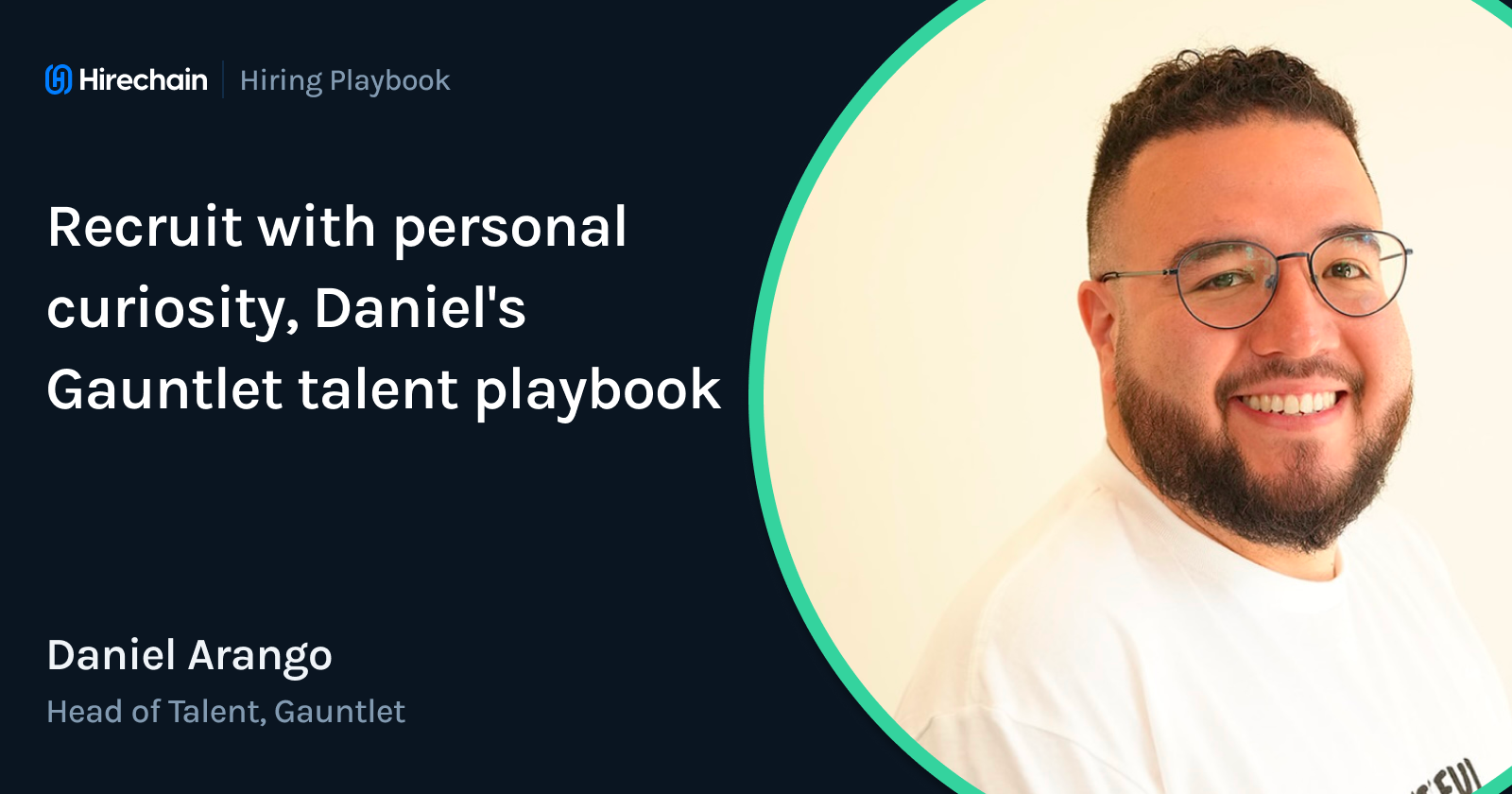Meet Daniel Arango

Danny Arango spent 13 years climbing every rung of the talent ladder: agency recruiting during the 2008 crisis, coordinator roles at Audible, solo hiring 100+ people at Equinox, building DigitalOcean's tech org from 50 people, and scaling Gemini's team to handle crypto's boom cycles. Now at Gauntlet, he takes a surgical approach to hiring quants, engineers, and researchers who operate at the intersection of DeFi and traditional finance.
Core belief: personal intellectual curiosity about people beats process every time.
Key Takeaways
Personal curiosity is your competitive advantage
Danny's breakthrough came early at an agency cold-calling strangers.
"I really liked getting on the phone with people, talking with them, learning about what drives them or doesn't drive them and why they'd be interested in talking to someone like me."
This became his consistent approach across every role.
What personal intellectual curiosity actually looks like:
- Asking about lived experiences, not just work history
- Understanding what someone needs from their next role, not what you need filled
- Building genuine interest in their motivations and constraints
- Learning their career trajectory desires, not assuming based on resume
- Discovering what energizes them beyond the paycheck
"People should be approaching recruiting from a personal intellectual curiosity about learning about other folks and ultimately what brings them to you."
This isn't soft skills fluff. It's strategic intelligence gathering. When you understand what actually drives someone, you can:
- Craft roles that retain them longer
- Predict who will scale with your company
- Identify culture adds versus culture fits
- Spot high-slope talent hiding behind modest resumes
The alternative—treating recruiting as a transaction—is why most startups have 40% turnover. You hired skills, not humans.
Founders must stay in the selling seat
Most founders think they can hand off recruiting once they hire their first talent lead. Danny disagrees. "I am a mouthpiece for those founders," he says. The gravitas of founder involvement can't be replicated by BD leads or recruiters.
What founder involvement actually means:
- Stay engaged in closing senior hires and key technical roles
- Don't delegate to "tell me if something blows up" mode
- Keep selling even when candidates come through agencies or referrals
- Your reputation is everything—shortcuts in hiring become visible fast
"Founder led sales is really important. Especially earlier stage when you're getting traction. Even if there's a very big key customer, they should be involved in those conversations."
Build your founder-talent relationship like breaking in shoes
Danny's unconventional interview approach for discussing head of talent roles: Simulate disagreements during the hiring process itself.
"It’s like the term, breaking in new shoes. You can't really break in new shoes. If they don't fit well the first time around, it's gonna take a really, really long time to get comfortable. Same thing with founders and first People hires. You have to have that rapport and shared comfort early"
How to stress-test the relationship:
- Ask about board relationships and investor dynamics upfront
- Role-play scenarios where you disagree on hiring decisions
- Request one-on-ones with key team members before accepting
- Present your recruiting thesis and test for alignment
- Get comfortable with pushback—you'll need it later
The best relationships combine personal foundation with professional delivery. Danny builds this through dinner & coffee conversations that reveal values, ethics, and what motivates someone beyond the work.
The first 10-15 hires determine your trajectory
These early employees aren't just filling roles—they're building your company's DNA through "blood, sweat equity." The challenge: many won't scale from 50 to 3,000 employees, and that's a feature, not a bug.
Signals someone will scale:
- Actively seeking external coaching and mentorship
- Asking for stretch projects outside their comfort zone
- Growing remit, scope, and responsibility with the company
- Growth mindset over fixed mindset
- Building skills they don't currently have
"Those are the different inflection points you see at different company sizes, where some people that were there pre-50 are not going to be interested in a company of 300 or 3,000."
When early hires can't scale, handle with care. These people built your success. Give them escape hatches—internal transfers, new projects, or graceful exits with your full support.
DeFi needs more why!
The transition from Web2 to crypto isn't just technical, it's philosophical.
"The why and the context behind the why matter so much more in crypto," Danny explains. In Web2, you're a cog in a polished wheel. In DeFi, you're building the plane while flying.
Key differences in crypto talent:
- Higher tolerance for product pivots, zero tolerance for people risks
- Need to explain the context behind every decision
- Less methodical structure, more rapid experimentation
- Talent professionals become "emergency brakes" for fast-moving teams
- Must put on selling hat—can't take candidate interest for granted
Focus on onboarding as much as sourcing
Companies obsess over top-of-funnel metrics while ignoring the first 90 days. Danny flips this:
"We do a disservice to caring about as much about onboarding those people and getting them up to speed."
Building effective onboarding:
- Provide support apparatus for rapid ramp-up
- Focus on getting people productive in first 90 days
- Understand capabilities once people actually join
- Create feedback loops between hiring and onboarding success
- Measure 90-day retention as religiously as time-to-hire
The crypto talent pool recycles the same people across projects. Strong onboarding becomes your differentiator when everyone's fishing from the same pond.
Hire from adjacent industries, not just crypto
Crypto experience matters less than conviction and resilience. Danny actively sources from AI, traditional finance, and adjacent tech sectors to diversify the talent pool.
Why adjacent industries work:
- Opens up 10x larger candidate pool
- Brings fresh perspectives to stale problems
- Reduces dependency on the volatile crypto job market
- Cross-pollination creates stronger solutions
- Conviction can be built; skills often transfer
"Be open to different strategies that are touching adjacent industries. Being able to draw from adjacent industries helps provide other diversification that you may not have considered."
Metrics that matter
Early indicators (pre-Series B):
- Founder time on hiring: Should be 30-50% in early stages
- First hire quality: These 10-15 people set your entire culture
- Referral rates from early employees: No referrals = culture red flag
Operational health:
- Time from first touch to close: Under 3 weeks for momentum
- 90-day retention rate: Better indicator than offer acceptance
- Internal mobility rate: Shows if people can grow with company
Long-term signals:
- Alumni starting companies: Sign of healthy talent development
- Boomerang hire rate: Indicates positive culture and growth
- Performance ratings by hire cohort: Is your bar trending up or down?
Key takeaways
✅ Lead with curiosity, not requirements. Understand what drives people before assessing if they fit your boxes.
✅ Respect equity comes from reps. Build trust through non-work interactions and handling crises together before you need it.
✅ Every hire must add value at your current stage. Don't hire for where you'll be in two years—hire for the next six months and reassess.
✅ Create alumni mafias, not just employees. The best cultures push people up and out to start their own ventures.
✅ Speed and standards aren't mutually exclusive. Move fast on decisions, but never compromise your hiring bar for momentum.
Pro tips
💡 Great recruiters are anthropologists, not salespeople. They study human motivation, not manipulation tactics.
💡 The shoe has to fit from day one. You can't "break in" a bad founder-talent relationship any more than you can break in shoes that don't fit.
💡 DeFi volatility requires talent stability. When products pivot weekly, your talent function becomes the emergency brake that prevents human casualties.
Need help hiring crypto talent? Post a job on Hirechain for free and get pre-qualified candidates that are worth your time.



